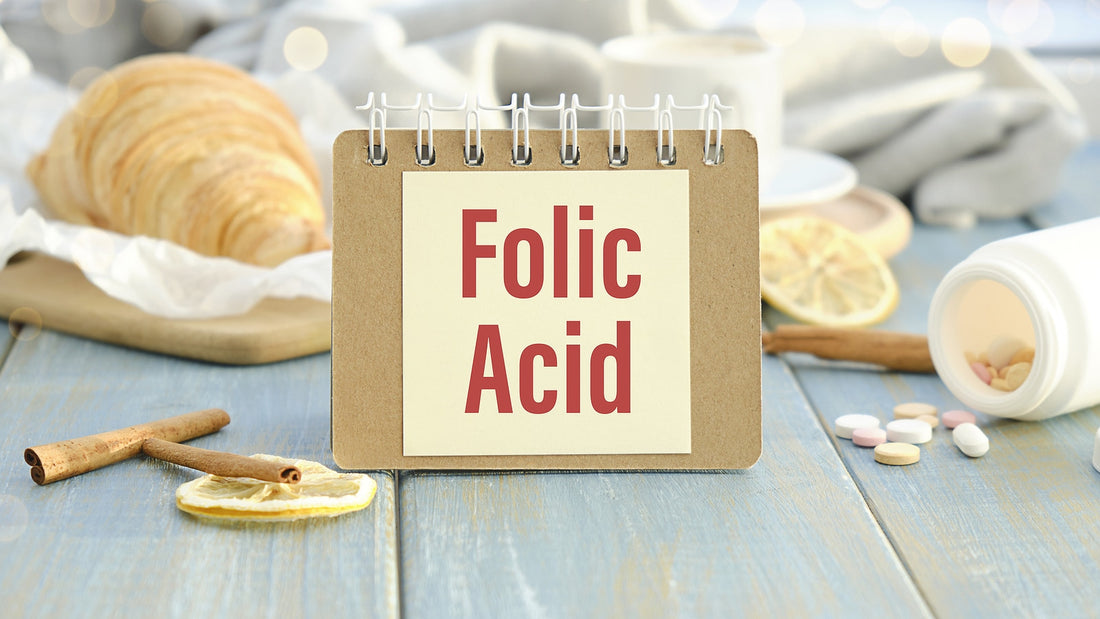When you hear of folic acid, what’s the first thing that comes to mind?
Maybe it’s a popular prenatal vitamin for an expecting mother. And while that’s one of the more common uses, men need folic acid too.
Why? Sit tight, because in this article we’re covering the health benefits of folic acid for men, how much is safe to take, any risks involved, and more.
Let’s begin.
What is Folic Acid?
Believe it or not, you won’t find folic acid anywhere in nature. It’s an oxidized, synthesized version of folate, also known as Vitamin B9.
Folate is an important part of DNA and RNA formulation, helping tissues divide and grow (1). It acts like a coenzyme that’s part of the protein metabolism process, and breaks down homocysteine, an amino acid that can be harmful to your body if there’s enough in your system.
So where does folic acid enter the scene? Converting folate into folic acid has been shown to be more easily absorbed by your body (2) and can be more stable than the natural version. For this reason, folic acid is often added to fortified foods and supplements.
Food Sources
Because folate isn’t something you produce naturally, you need to get it from the foods you eat. Some of the best food sources include (4):
- Kale
- Peas
- Bananas
- Liver
- Spinach
- Beans
- Melon
- Lemons
- Avocado
- Beef
- Strawberries
- Eggs
- Bread
- Rice
- Broccoli
As with other vitamins and minerals, variety is key. Make sure you’re getting plenty of different colored fruits and vegetables in your diet.
Health Benefits
Folate is an important nutrient your body needs to operate at its best. Not getting enough can result in anemia, feeling fatigued, shortness of breath, weight loss, diarrhea, and irritability (11).
If you supplement with folic acid, you can look forward to potential health benefits in the areas of:
- Fertility: If you’re trying to start (or continue) a family and struggle with poor sperm quality, folic acid may help. While evidence is mixed, some studies show that men who took a combination of zinc and folic acid had an increased sperm count of 74% over those who didn’t take the combination (10).
- Mental Health: Recent data reports around 15.8% of men in the United States struggle with mental health (7). Some research indicates those with lower folate levels are at higher risk for developing health concerns like depression (8), so making sure you get enough can help you reduce your risk.
- Anti-Aging: An interesting study showed that when combined with creatine, folic acid helped speed up cell regeneration on the skin, reducing the effects of sun damage (9).
- Heart health: The older you get, the more heart health should take priority. Because folate helps create red blood cells, it’s important in the fight against various heart diseases. One meta-analysis reported those that took folic acid reduced their risk for getting a stroke by 10%, in addition to a 4% lowered risk for developing heart disease (3).
Risks and Side Effects
Folic acid is considered water soluble, meaning anything your body doesn’t use is excreted through your urine. Because of this, it’s generally considered safe to take with little risk.
Even with its potential health benefits, there have been some cases where taking folic acid regularly contributed to an increased risk of prostate cancer in some men (6).
As long as you take the recommended amount, you should be fine. However, if you have allergies (5) and take folic acid supplements, you could experience side effects like:
- Itchy skin
- Redness or inflamed skin
- Skin rashes
- Difficulty breathing
If you notice any of these symptoms, discontinue right away.
Dosage
When it comes to knowing how much folic acid to take, it’s important to keep two aspects (1) in mind:
- UL: This stands for “Tolerable Upper Intake Level” or Upper Level. It represents the highest amount you can take without experiencing negative side effects. In healthy adults, the UL for folic acid supplements is 1,000 mcg per day. Note: This number doesn’t include the amount of folate you get from your diet.
- RDA: This stands for “Recommended Dietary Amount” or Allowance. It represents the average daily amount you should get, whether through food or through supplementation. For adult men, your daily recommended amount of folic acid is around 400 mcg per day. Note: If you regularly consume alcohol it’s recommended you take 600mcg per day, as alcohol may limit how much you can absorb.
Conclusion
Your body is designed to need a variety of different vitamins, minerals, and micronutrients. Some of these you produce yourself, and others you need to get from the foods you eat.
Folate, a B Vitamin, is an important nutrient that plays a role in cell production. Folic acid is a more absorbable form and can be found in many fortified foods and supplements.
If you’re looking to improve your fertility, heart and mental health, eat more folate-rich foods first. If you don’t feel like you’re seeing improvements in the areas you’d like, talk with a functional medicine nutritionist about supplementation. Together, you can create a plan that will help you reach your health goals.
Learn something new about folic acid? Share this with a friend today!
References & Disclaimers
1. https://www.hsph.harvard.edu/nutritionsource/folic-acid/
3. https://www.ncbi.nlm.nih.gov/pmc/articles/PMC5015297/
4. https://ods.od.nih.gov/factsheets/Folate-HealthProfessional/
5. https://www.mayoclinic.org/drugs-supplements-folate/art-20364625
6. https://bmjopen.bmj.com/content/2/1/e000653
7. https://www.nimh.nih.gov/health/statistics/mental-illness
8. https://pubmed.ncbi.nlm.nih.gov/28759846/
9. https://pubmed.ncbi.nlm.nih.gov/18254806/
10. https://pubmed.ncbi.nlm.nih.gov/11872201/
11. https://my.clevelandclinic.org/health/diseases/22198-folate-deficiency
✝✝This noted statement is based on independent research and is not necessarily the opinion of the author
